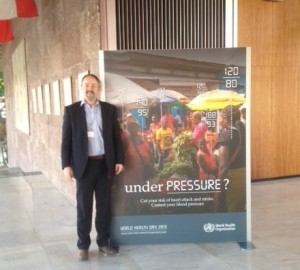The WHO World Health Day, took place in Geneva on the 3rd of April and the focus was on knowing your blood pressure. Here is a version of the talk I gave at the WHO on the day:
It is increasingly clear that high blood pressure contributes to a substantial number of deaths worldwide, with one in eight of all deaths globally attributable to high blood pressure. Therefore, the recognition and treatment of high blood pressure is a major priority for public health worldwide.
Because the risk associated with increasing blood pressure is continuous: each 2 mmHg rise in systolic blood pressure is associated with a 7% increased risk of mortality from ischaemic heart disease and a 10% increased risk of mortality from stroke.
Consequently, even small changes in blood pressure can have a profound impact upon the health of a nation. In addition, the majority of events occur in people with mild hypertension, often in those who are economically active. Thus the economic burden for inaction, for not detecting and treating blood pressure, for developing countries will be substantial.
Routine screening and treatment of high blood pressure should therefore become the norm and form a major part of a nations health strategy. As a GP myself, hypertension accounts for a substantial amount of primary care workload; as an example, in the UK it accounts for 12% of all primary care consultations.
With increasing obesity and an ageing population the problem of high blood pressure is set to increase. Therefore managing this tidal wave requires engagement with the wider community.
Given the size and extent of the problem, to improve the wellbeing of individuals and communities, health systems will need to prioritize and target self-care activities.
Self-care is the ability of individuals, families and communities to promote health, prevent disease and maintain wellbeing.
We have been working for the last two years, with the WHO on a Self care in NCDs guideline which is due for publication imminently. Self-care can involve a number of lifestyle changes that can be extremely effective in reducing high blood pressure: eating a healthy diet , reducing salt intake (to less than 5g daily),exercising regularly , stopping smoking and reducing alcohol consumption.
However, in many cases medication must be used, in conjunction with lifestyle changes.
Community interventions will need to be delivered beyond health care institutions, targeted to the detection and ongoing management of blood pressure, aiming to work closely with primary health care. Such programs should have sufficient flexibility to ensure they are locally and contextually appropriate.
Structured training for community workers to aid the detection and ongoing management of hypertension and, education and informing the wider public are a priority for healthcare systems.
Finally, once treatment has been initiated we need to think about how individuals can be empowered to effectively manage their own care. Self-monitoring of blood pressure has evidence for its effectiveness, particularly where the affordability of the technology has been established. Also strategies to improve adherence to medications should form part of the overall self-care pathway for hypertension.
In developing a strategy to tackle high blood pressure there are two important issues to recognize: first, that hypertension often coexists with other diseases and health systems should avoid vertical systems; second, there is a need to continually develop the evidence base, using a network of epidemiology centres to identify and evaluate effective programs targeted at blood pressure care, sharing best practice. It is important that interventions need to be based on evidence- resources are scarce; (expert patient programs have wasted money in the past)
We can prevent 80% of cardiovascular with what we already know; we now need action to implement effective change to improve blood pressure care and expediency to further develop the evidence base for what is effective and what is not.
